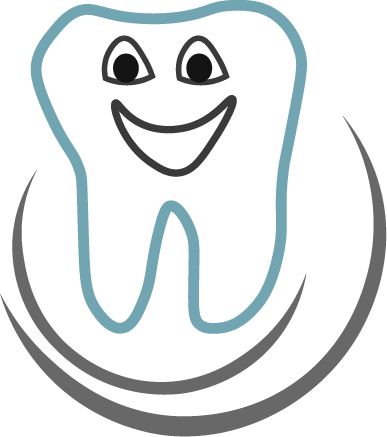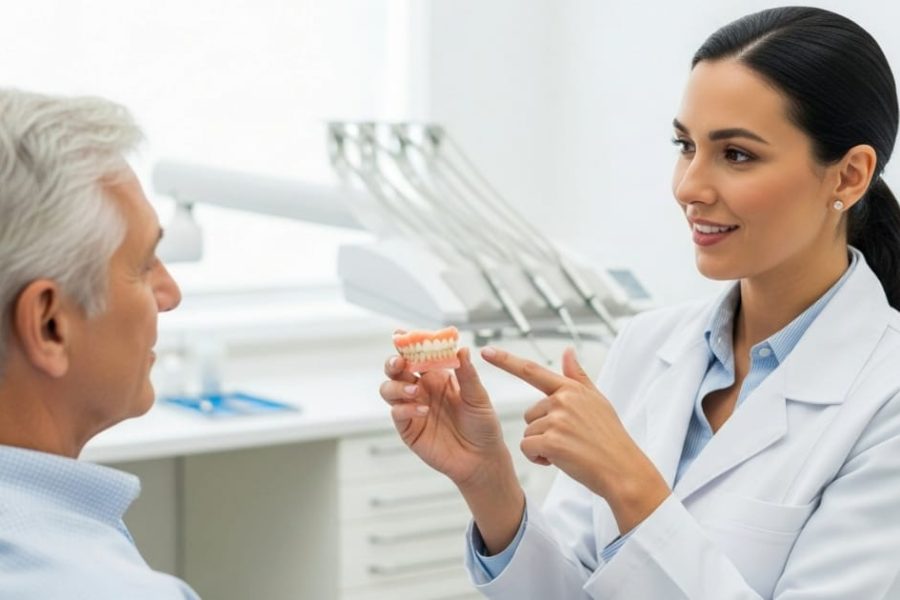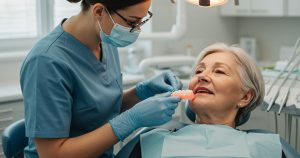If you wear dentures, whether full or partial, you know they are a key part of your health, comfort, and confidence. But just like natural teeth, you must wonder about how to clean dentures at home since they can accumulate plaque, food debris, and stubborn stains, leading to bad breath, gum irritation, and even infections like thrush.
The good news? It’s simple and inexpensive to maintain a routine to clean dentures at home in just a few minutes! Forget the old wives’ tales and damaging hacks. This is your comprehensive, dentist-approved guide to keeping your dentures sparkling clean, comfortable, and long-lasting using the best store-bought and DIY solutions.
The Essential Daily Denture Cleaning Routine: Brush and Soak
Dentures are a valid option for treating missing teeth; therefore, proper denture hygiene is essential for those who choose them. This routine relies on a simple, two-step method: mechanical brushing to remove physical debris, and chemical soaking to disinfect. Both steps are crucial for maintaining a healthy appliance and mouth.
Let’s break down how you can clean dentures at home:
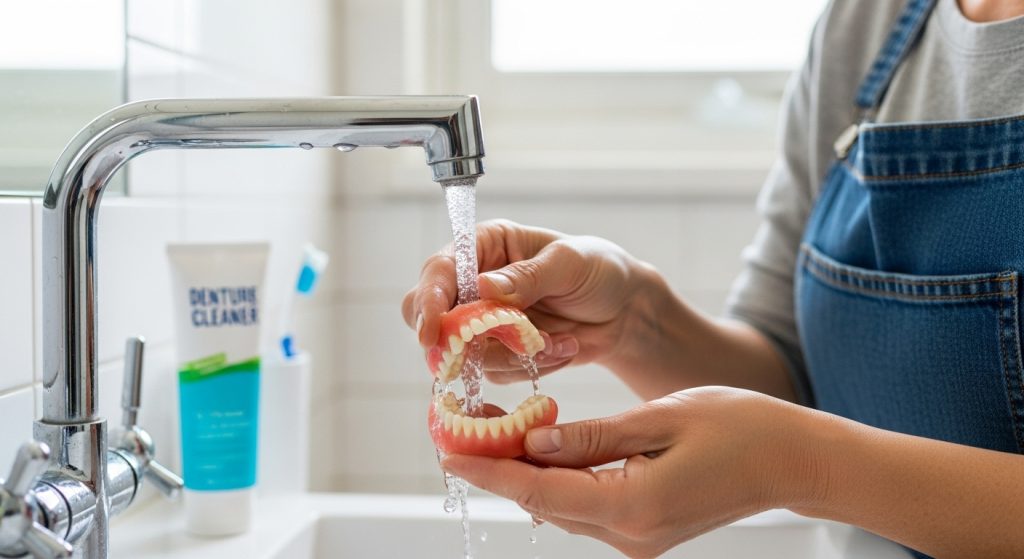
Step 1: Mechanical Cleaning (The Daily Brush)
Brushing is the most effective way to remove food particles and the sticky bacterial film known as biofilm or plaque. It should be done at least once daily.
Start by removing your dentures and rinsing them thoroughly under cool or lukewarm running water after every meal; this immediately removes loose food debris. For safety, always clean your dentures over a sink filled with water or a folded towel to cushion the fall and prevent breakage if you accidentally drop them. For the brushing itself, always use a soft-bristled denture brush (which is shaped to clean all contours) or a very soft, standard toothbrush. It is vital to use mild hand soap, mild dishwashing liquid, or a non-abrasive denture cleaning paste as your cleaning agent.
NEVER use regular toothpaste to clean dentures at home! Toothpastes are formulated to polish hard tooth enamel and often contain abrasive particles that can scratch the softer acrylic surface of dentures, creating tiny grooves where bacteria and stains can thrive. Gently scrub all surfaces, including the artificial teeth, the pink base that fits against your gums, and especially any metal clasps (on partial dentures) where plaque often builds up.
Step 2: Chemical Cleaning (The Overnight Soak)
Dentures need to stay moist to retain their shape and prevent warping, so soaking them overnight or for several hours daily is essential for disinfection and deep cleaning. It is highly recommended to remove your dentures overnight to give your gums and mouth tissues a chance to rest and recover.
To soak them, place your dentures in a container filled with water or a commercial denture-soaking solution (often in tablet form), following the manufacturer’s instructions for soaking time. After soaking, always rinse your dentures thoroughly before putting them back in your mouth, especially to remove any residue from a chemical solution that could irritate your oral tissues.
Even when your dentures are soaking, remember to clean your mouth: gently brush your gums, tongue, and the roof of your mouth with a soft toothbrush to remove any remaining bacteria and stimulate circulation.
The following video demonstrates the explained steps on how to clean dentures at home:
Dentist-Approved DIY Methods to Clean Dentures At Home
While commercial cleaners are highly effective, a few common household ingredients make excellent, non-abrasive alternatives, particularly for occasions when you want to clean dentures at home. Remember, these methods are best used in addition to your daily routine and regular dental cleanings, not as a replacement for daily brushing!
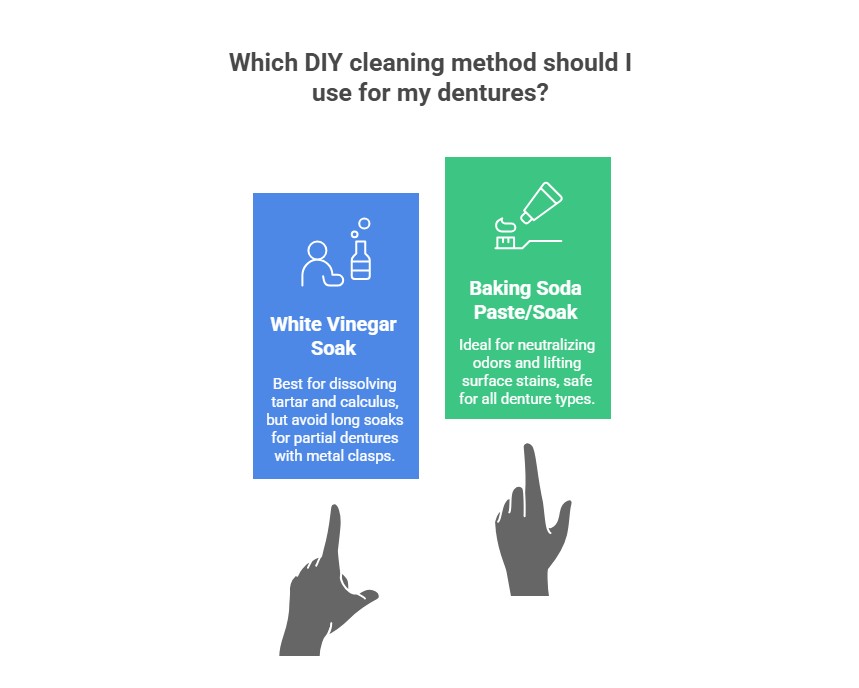
White Vinegar Soak (Best for Tartar/Calculus)
White vinegar is a mild acid that works effectively to loosen and dissolve mineral deposits (calculus or tartar) that can build up on the denture surface over time.
How to use: create a solution by mixing equal parts white vinegar and warm water (a 1:1 ratio). You can soak your full dentures overnight in this solution. However, you must avoid soaking partial dentures with metal clasps in vinegar for long periods, as the acid can potentially corrode the metal. For partials with metal, use this method occasionally and for shorter durations (like 30 minutes). Always brush thoroughly with a soft brush and rinse well after the soak to remove any lingering vinegar taste.
Baking Soda Paste/Soak (Best for Odor and Plaque)
Baking soda, or sodium bicarbonate, is a gentle and natural abrasive that helps neutralize odors and lift surface stains without scratching the acrylic.
How to use: For brushing, mix a small amount of baking soda with water to form a non-abrasive paste, and use this paste with your soft denture brush instead of soap. For soaking, dissolve a tablespoon of baking soda in a glass of warm water and soak your dentures for 15-30 minutes, or overnight, to help deodorize and disinfect. It’s an easy, budget-friendly option to keep your dentures feeling fresh.
Nicotine, tea, coffee, and red wine cause surface stains. Regular soaking with denture tablets helps loosen these deposits. For stubborn discoloration that won’t budge with at-home methods, ask your dentist about a professional cleaning.
Read More: Teeth Whitening for Smokers: What Is the Most Effective Option?
Contact Us for Help!
Wondering about getting new dentures or how to keep them clean?
Book a consultation to discuss your concerns and choose the best option for a lasting smile!
Special Sections: Cleaning Different Types of Dentures
Dentures are considered a subclass of cosmetic dentistry types; however, they do have different kinds themselves, and based on your needs, you might need a specific approach to clean dentures at home:
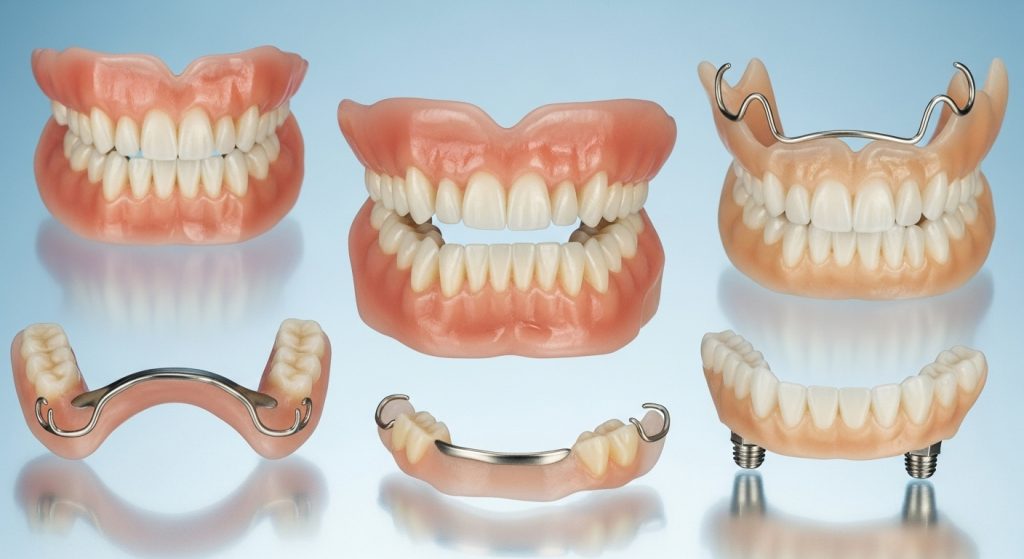
Partial Dentures (with Metal Clasps)
If your partial denture has metal components, you must adjust your soaking routine. Brush and soak daily as described above, but avoid hypochlorite bleaches (like Milton) and limit vinegar soaks, as these powerful chemicals can quickly tarnish and corrode the metal.
Stick to non-abrasive cleansers, commercial denture tablets approved for metal, and cool water.
Adhesives: Clean Removal, Clean Re-application
To maintain both hygiene and fit, you must thoroughly remove residual adhesive with gentle brushing and warm water during your nightly cleaning routine. The next day, reapply the adhesive sparingly according to the product instructions. Using too much adhesive can actually trap bacteria and affect the intended fit of the denture.
Implant-Supported Dentures
The care needed for implant-supported dentures depends on whether they are removable or fixed:
- Removable (Overdentures): These should be removed and cleaned at least twice daily and soaked overnight like standard dentures. You must also diligently clean the gum tissue and the implant abutments (the parts that stick out of your gum).
- Fixed (Screw-Retained “Hybrids”): Since these are not removed at home, you must brush thoroughly around the prosthesis and implants. Use specialized dental tools like floss or interdental aids as directed by your dentist to clean beneath the arch. Regular professional maintenance is essential to clean areas you cannot reach.
Weekly Deep-Clean Options (Add 15–20 minutes, 1–2×/week)
For an occasional boost to your daily routine, you can do these deep cleansings once or twice a week to better control bacterial load, reduce odor, and break down surface buildup.
Effervescent Tablets (Alkaline Peroxide)
Drop a specialized denture-cleaning tablet into warm (not hot) water and soak as directed. The ADA widely recommends these tablets, which are gentle on most dentures and aim to reduce bacteria and odor. Always brush and rinse your dentures thoroughly after using a tablet.
Pro tip: According to Colgate, hot or boiling water can warp dentures, so stick to cool or warm water when cleaning dentures at home!
Crucial Mistakes to AVOID When Cleaning Dentures
Protect your investment and your oral health by steering clear of these everyday, damaging habits:
| Mistake to Avoid | The Damage It Causes | Dentist-Approved Alternative |
| Using Regular Toothpaste | Scratches the acrylic, creating places for bacteria and stains to hide. | Mild hand soap, dish soap, or a specialized denture paste. |
| Using Hot or Boiling Water | Causes the acrylic to warp or change shape, permanently ruining the fit of the denture. | Only use cool or lukewarm water for cleaning and rinsing. |
| Using Bleach or Chlorine | Can weaken the denture material over time and may discolor the pink acrylic base. Corrodes metal clasps on partials. | Use a commercial denture tablet or a diluted vinegar soak (on full dentures). |
| Not Cleaning Your Mouth | Bacteria, fungi, and plaque can still build up on your gums, tongue, and palate, leading to oral infections and gum disease even with clean dentures. | Brush your gums, tongue, and the roof of your mouth with a soft toothbrush every morning and night. |
Simple Shopping List to Clean Dentures at Home (What You Actually Need)
The next time you’re walking down the aisle of a convenience store, these are all the things you’ll need for cleaning dentures at home:
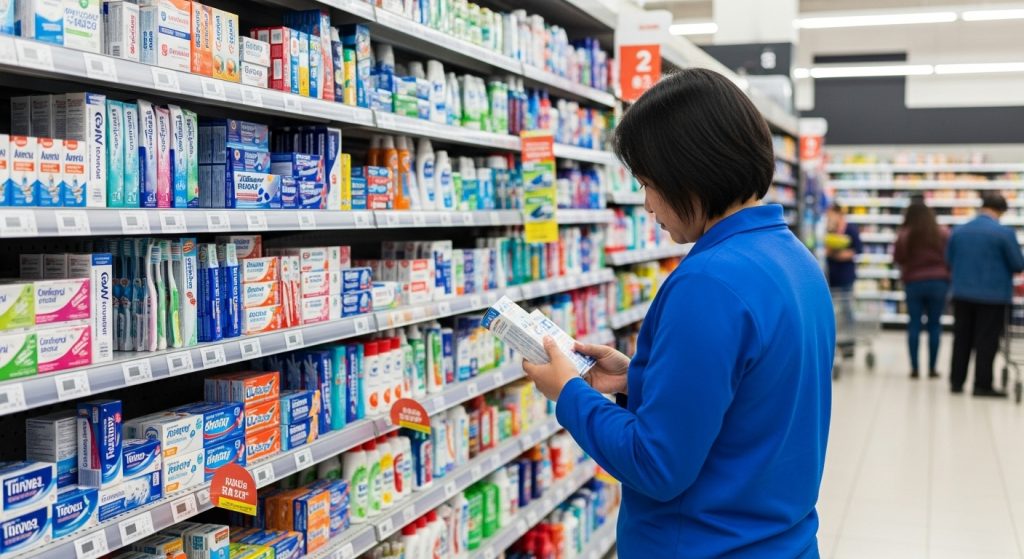
- Soft denture brush or a soft toothbrush
- Non-abrasive denture cleanser or mild dish soap
- Effervescent denture-cleaning tablets (optional but helpful)
- Covered container for soaking
- Soft towel to line the sink
The Key to Comfortable and Lasting Dentures
Proper denture care is essential for preventing bad breath, gum disease, and the expensive need for repairs or replacements. By committing to a simple brush and soak routine, using non-abrasive cleansers, and following dentist-approved DIY alternatives cautiously, you can ensure your dentures remain hygienic, comfortable, and structurally sound for years to come.
Besides maintaining a routine to clean dentures at home, remember to schedule regular dental check-ups. Your dentist or prosthodontist can perform a professional deep clean to tackle stubborn tartar and check the fit of your appliance, ensuring optimal oral health. If you need an emergency dentist in North York, don’t wait for regular hours. For immediate relief and same-day service, book an appointment right away. We are here to help newcomers and travelers get fast, reliable care when they need it most.
FAQ
Should I remove my dentures at night?
Generally, yes! Dentists strongly recommend removing dentures for at least six to eight hours each day, preferably overnight. According to Healthline, this gives your gum tissues a chance to rest, reduces pressure, and allows for natural cleansing by your saliva, which prevents infection.
Can I use regular toothpaste to clean dentures at home?
No. Most toothpastes are abrasive and can scratch denture acrylic. Use a non-abrasive denture cleanser or mild soap instead.
Can I use an ultrasonic cleaner?
Yes, absolutely. Ultrasonic cleaners are an excellent supplement to daily brushing and soaking. They use high-frequency vibrations to create bubbles that dislodge debris, providing a highly effective deep clean, especially for hard-to-reach areas.
How do I clean around implants with fixed dentures?
Brush twice daily with a soft brush. Clean under the prosthesis and around implants using floss/interdental tools as instructed by your dental team. Keep regular maintenance visits.
Are dish soap or hand soap okay to clean dentures at home?
Mild dish or hand soap is commonly recommended for daily brushing when denture cleanser isn’t available. Rinse well afterward.
Is bleach okay to clean dentures at home?
Avoid household bleach to clean dentures at home. Certain dental hypochlorite products may be used briefly on acrylic dentures only; never use them on metal-containing partials. Follow product labels and your dentist’s advice.
What if I have a soft lining on my denture?
Dentures with soft linings require extra gentle care. Avoid hard-bristled brushes, regular toothpaste, and strong chemical soaks, as these can damage the lining material. Use a very soft brush and mild soap, and consult your dentist about the best specific denture cleaner formulated to be safe for soft linings.
How often should I see my dentist after getting dentures?
You should continue to see your dentist or prosthodontist at least once or twice a year, or as they recommend based on your individual needs. These appointments are essential for checking for signs of oral disease, performing professional deep cleanings, and ensuring the fit of your dentures remains comfortable and stable.
Do you have dentures? How do you maintain a daily routine and a specific rotation to clean dentures at home? Share your thoughts in the comments and join the conversation.

